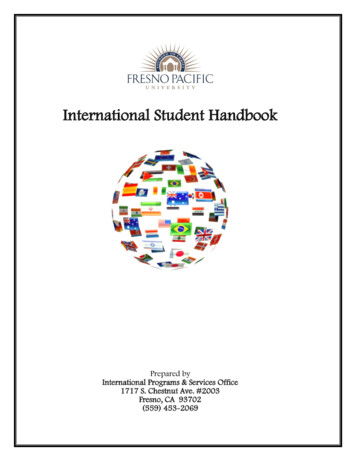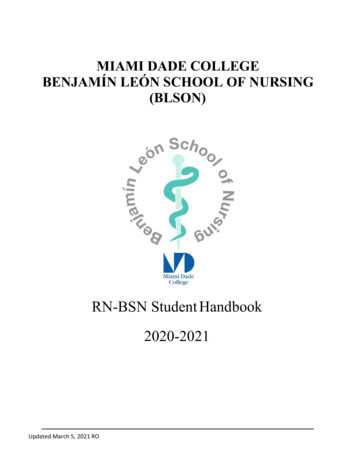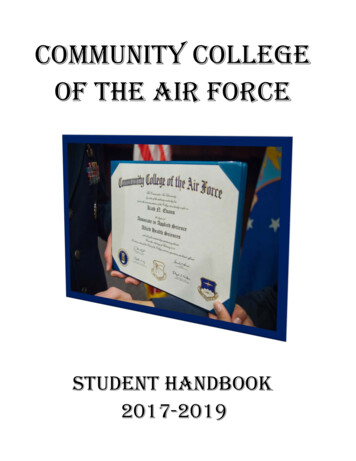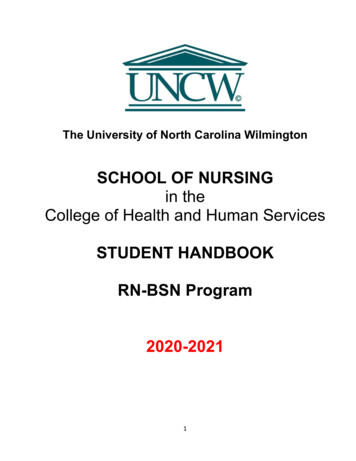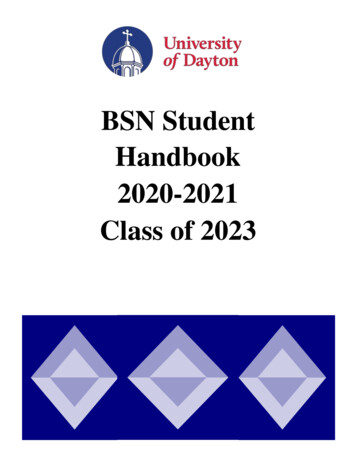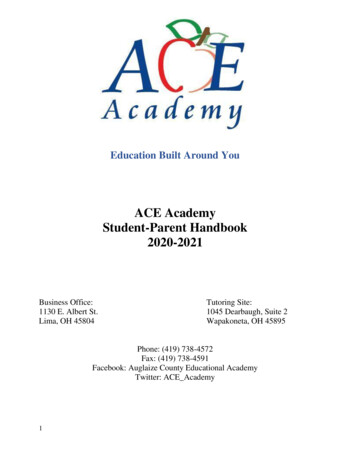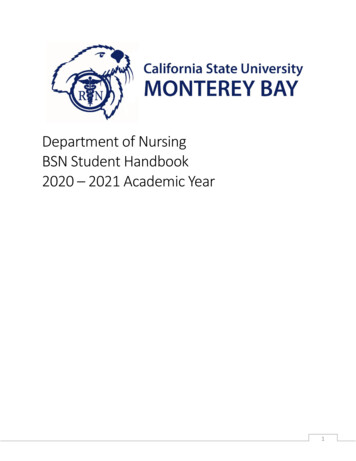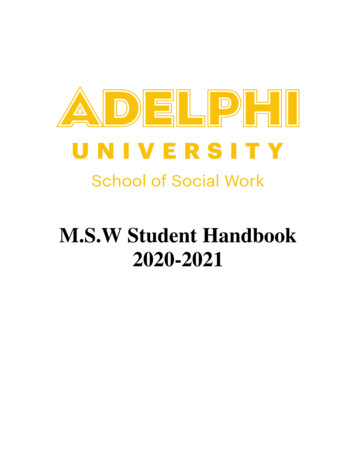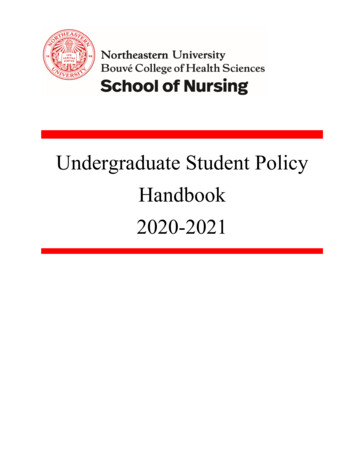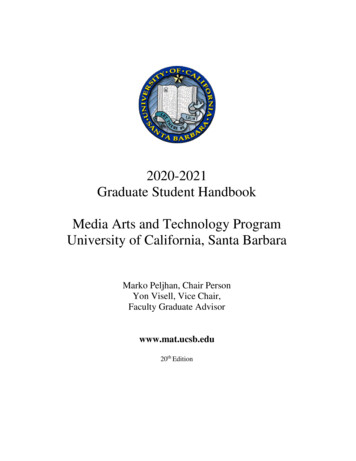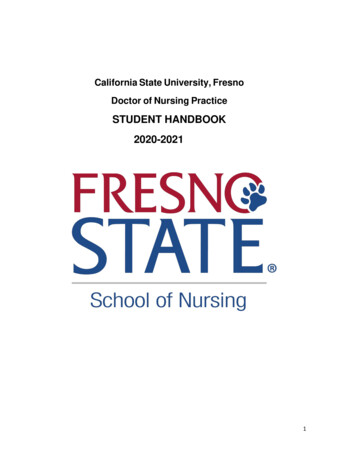
Transcription
California State University, FresnoDoctor of Nursing PracticeSTUDENT HANDBOOK2020-20211
DESCRIPTION OF THE PROGRAM3PROGRAM MISSION3SCHOOL OF NURSING PHILOSOPHY3PROGRAM FOR MASTER’S PREPARED NURSES WITH ADVANCED PRACTICESPECIALTIES4PROGRAM FOR MASTER’S PREPARED NURSE GENERALISTS4STUDENT LEARNING OUTCOMES4PROGRAM OUTCOMES5DNP PROGRAM CONTACT INFORMATION5ADMISSION REQUIREMENTS6Types of Admission6TRANSFER OF CREDITS EARNED AT OTHER INSTITUTIONS8PROGRAM TIMELINE8REQUIREMENTS FOR SATISFACTORY PROGRESS IN THE PROGRAM9Progress of Required Documents for Degree Completion16POLICIES & PROCEDURES17STUDENT GRIEVANCES17PRACTICA EMBEDDED IN THE PROGRAM17QUALIFYING ASSESSEMENT17DOCTORAL PROJECT18DOCTORAL PROJECT COMMITTEE19INSTITUTIONAL REVIEW BOARD REQUIREMENTS19ADVANCEMENT TO CANDIDACY19APPLICATION FOR CANDIDACY FOR THE DEGREE OF DOCTOR OF NURSINGPRACTICE.20POLICIES ON PROFESSIONAL ETHICS & ACADEMIC INTEGRITY20CODE OF ACADEMIC INTEGRITY HONOR CODE20CHEATING & PLAGIARISM22STUDENT FEES29LEAVE OF ABSENCE OR WITHDRAWING FROM THE UNIVERSITY29HARASSMENT & DISCRIMINATION Nondiscrimination Policy30REQUESTING ACCOMMODATION FOR DISABILITY322
DESCRIPTION OF THE PROGRAMThe Doctor of Nursing Practice (DNP) prepares experts in specialized advanced nursingpractice for leadership and clinical roles and to engage in evidence-based inquiry.Graduates may also serve as faculty in postsecondary nursing education programs.The curriculum is based on the American Association of Colleges of Nursing’s TheEssentials of Doctoral Education for Advanced Nursing Practice (2006) and meets allrequirements for national accreditation. The program is designed for workingprofessionals with the majority of coursework provided via distance modalities. Thecohort-based DNP program is designed to be completed in five semesters (fall, spring,summer, fall, spring) of full-time study consisting of 37 doctoral units and a culminatingdoctoral project.PROGRAM MISSIONThe mission of the DNP program is to prepare promising nursing leaders, advancedpractice clinicians, and nursing faculty with high leadership potential to examine criticallycurrent healthcare practices and policies from a broad theoretical and practicalperspective; and to formulate clinical, administrative, and instructionally effectiveleadership approaches that can improve the quality of healthcare throughout the state.SCHOOL OF NURSING PHILOSOPHYCalifornia State University, Fresno School of Nursing offers comprehensiveprograms that lead to Bachelor of Science and Master of Science degrees in Nursing.A strong general education component in the undergraduate programs fosters lifelonglearning. The master’s program is designed to provide specialized study in selectedadvanced practice fields. The University’s commitment to the San Joaquin Valley is toprepare students for industries and professions serving the community. To achieve themission, California State University, Fresno supports applied research and publicservice programs as a means to enhance faculty development and instruction, whilecontributing to the intellectual, social, cultural, and economic vitality of the San JoaquinValley and California.Fresno State School of Nursing philosophy underlies the foundation for the DNPcurriculum. For a complete reference to the philosophy please access the School ofNursing website. .html3
PROGRAM FOR MASTER’S PREPARED NURSES WITH ADVANCEDPRACTICE SPECIALTIESProfound and unprecedented change in healthcare created a need for knowledgeable,innovative clinicians and nurse leaders. Career opportunities for nurses with leadershipskills have never been greater. The DNP program is designed to prepare students toassume leadership and clinician roles within the emerging healthcare delivery system.The program prepares the graduate for advanced nursing practice, defined by AACN(2004) as any form of nursing intervention that influences healthcare outcomes forindividuals or populations, including the direct care of individual patients, managementof care for individuals and populations, administration of nursing and healthcareorganizations, and the development and implementation of health policy.The program of study includes didactic and practicum courses that link the expansion ofscientific knowledge with a focus on practice that is innovative and evidence-basedacross a variety of settings relevant to the specialty. Clinical experiences are developedto assure that experiences are consistent with each individual’s career path andspecialty competencies.PROGRAM FOR MASTER’S PREPARED NURSE GENERALISTSThe master’s degree prepared nurse generalist DNP graduate leads practice at thehighest level in an increasingly complex healthcare system. This individual workscollaboratively to promote evidence-based healthcare that is safe, effective, and patientcentered with a focus on quality and high-level patient-care outcomes. Systemstransformation is the center of this nurse’s advanced practice.STUDENT LEARNING OUTCOMESThe primary Student Learning Outcomes are taken directly from the AmericanAssociation of Colleges of Nursing’s The Essentials of Doctoral Education for AdvancedNursing Practice (2006).The eight overarching essentials form the DNP program’s coreconcepts which are threaded throughout coursework.4
PROGRAM OUTCOMESThe goal of the Doctor of Nursing Practice program is to prepare advance practicenurses to be clinical scholars, and health policy leaders. Program outcomes have beenidentified as preparing the graduate to:1. Provide safe, effective, and efficient care within the scope of advancednursing practice.2. Develop effective strategies to ensure the safety of patients andpopulations.3. Critically analyze literature and develop best practices.4. Translate research into clinical practice.5. Measure patient outcomes.6. Design, implement, and evaluate quality improvement measures.7. Analyze the cost-effectiveness of practice initiatives.8. Evaluate information systems and patient care technology.9. Influence health care policy, educate others about health disparities, andadvocate for social justice.10. Demonstrate leadership skills to ensure patient outcomes, enhancecommunication, and create change in healthcare.DNP PROGRAM CONTACT INFORMATIONDenise SeabertDeanCollege of Health and Human Servicesdseabert@csufresno.edu559-278-4004Sylvia Miller, Ed.D., FNPChair, School of Nursingsymiller@csufresno.edu559-278-4788Kathi Rindahl, DNP, FNP-CDNP Program hor YangDNP Administrative Support Coordinatorchor yang@csufresno.edu559-278-77705
ADMISSION REQUIREMENTSTo enroll in the DNP program, the individual applies to California State University,Fresno and the program. In order to be considered for admission to the program, at aminimum, the applicant must have: Master’s DegreeIf the applicant has a master’s degree in nursing, the degree must be froman accredited institution.If the applicant has a master’s degree in a health related field (e.g. PublicHealth or Health Administration), additional post-baccalaureate courses innursing theories, research methods, transcultural nursing and informaticswill be required. Transcripts will be evaluated and an individual plancreated at the time of applicant review. National CertificationThe applicant must have national certification in nursing or obtaincertification prior to the fifth semester of the DNP program. Additional RequirementsU.S. citizen or U.S. permanent residentMeet admission requirements to California State University, FresnoProvide official transcripts from all institutions of higher learning attendedHave an overall GPA of 3.0 or greaterDemonstrate sufficient preparation and practiced experience as an APN,nurse manager / administrator / executive / educator / experienced nurseHave a current, unrestricted California RN licensure and advancedpractice national certification if applicableComplete an application for admission to California State University,FresnoThe admission process includes: A complete application for admission to California State University, Fresnovia CSU Mentor A complete application to the CSUFFRESNODNP program A letter of recommendation with completed recommendation form from theindividual’s current supervisor Contact information of two additional references who are professionalcolleagues or professors from the individual’s master’s program A personal written statement of purpose Completion of required interview and on-site writing sample Official documentation of nursing practicum hours attained during themaster’s degree program or post-master’s certificate programTypes of Admission6
Conditionally Classified - The applicant granted conditionally classified graduatestanding has been admitted to the DNP program, and conditionally to the university, buthas not yet satisfied all university/program admission requirements.Classified - The applicant granted classified graduate standing has been admitted tothe university and fulfilled all program admission requirements. Thus, classifiedgraduate students are those who have been fully admitted to the program.ADVISING & MENTORINGThe advising and mentoring component of the DNP program is designed to provide anarray of professional development opportunities. Each student is assigned a programadvisor at the start of the program. The program advisor assists the student in selectinga project chair, along with two other committee members. The student selects apracticum mentor with the program advisor’s approval. Advisors and mentors assist thestudent in identifying professional development experiences and professionalassociations / networks to enhance their success in the program.The role of the program advisor, project chair and practicum mentor are to:a) promote a well-planned and efficient DNP course of study that can becompleted within five semesters by a working professional;b) provide guidance and information that foster academic and professionaldevelopment;c) assist a student as the individual applies knowledge gained through courseworktoward improving nursing practice and client outcomes;d) advocate on behalf of the student and their academic needs;e) create a doctoral culture typified by:1. Scholarly discussion and dialogue that foster critical inquiry and clinicalreasoning;2. Expert supervision of a DNP candidate in the conduct of a doctoralproject.3. Fostering informal assessment and feedback designed to enhancestudent reflection on their doctoral role in advanced nursing practic7
Figure 1. Executive Leadership Team/Advisor/Mentor/Student RelationshipTRANSFER OF CREDITS EARNED AT OTHER INSTITUTIONSStudents are encouraged to complete the entire program with their cohort. Underunusual circumstances, a student may transfer up to 12 units into the program, only ifthe institution offering the work is accredited. The DNP executive leadership considersthe transfer of units on an individual basis. Documentation of coursework and coursesyllabus must be provided. The courses must have been taken within the last five yearsand the student must have earned a grade of B or better in the courses. Courseworkfrom outside the United States is not permitted for use towards the DNP degree.PROGRAM TIMELINEThe DNP program is designed to be completed in 5 semesters of full time study.Students are admitted once a year in the fall and complete coursework as a cohort.There is no part-time option. All requirements for the degree are to be completed withinfive years of achieving classified standing in the doctoral program. The appropriatecampus authority, consistent with campus policy, may extend up to two years the timeallowed for completion of the requirements under the following circumstances: The student is in good standing. The extension is warranted by compelling individual circumstances, and The student demonstrates current knowledge of research and practice innursing as required by the campus.8
Fall Year 1NURS 574 The Role of Diversity & Social Issues in Health Care (2 units)NURS 575 Application of Theories to Healthcare Leadership (2 units)NURS 576 Application of Biostatistics to Populations (3 units)Spring Year 1NURS 583 Leadership & Professional Responsibility in Complex Healthcare Systems (2 units)NURS 584 Technology, Informatics, & Data Management in the Transformation of Healthcare (3 units)NURS 585 Foundations of Evidence-based Practice (2 units)NURS 295 Practicum (6 units) Contingent on hour requirementSummer Year 1NURS 586 Transformation of Healthcare Systems: Health Policy & Economics (2 units)NURS 587 Principles of Epidemiology (3 units)NURS 595 Translating Evidence into Reflective Practice I (2 units)NURS 295 Practicum (6 units) Contingent on hour requirementFall Year 2NURS 591 Curriculum Development (3 units)NURS 593 Financial Aspects of Projects & Practice (2 units)NURS 596 Translating Evidence into Reflective Practice II (2 units)NURS 295 Practicum (6 units) Contingent on hour requirementSpring Year 2NURS 592 Evaluation in Education (3 units)NURS 594 Application of Evidence-Based Teaching in Nursing, elective (2 units)NURS 597 Doctoral Project (2units)NURS 295 Practicum (6 units) Contingent on hour requirementProgram Time Line (for brief description of courses please see website: curriculum es-programs/dnp.htmlREQUIREMENTS FOR SATISFACTORY PROGRESS IN THEPROGRAMIn order to progress in the DNP program, the student must maintain at least a 3.0 gradepoint average for the program. A student who falls below a 3.0 grade point average, orreceives less than a C grade in a course in any one term will be placed on academicprobation and notified in writing. If a student fails to make satisfactory progress, theindividual may be officially disqualified from the program after a thorough case review.Disqualification is based on the recommendation of the DNP program faculty. Thestudent must be notified in writing of the disqualification and given the opportunity toappeal. Once disqualified, the student is not allowed to continue in the program withoutformal re-application and re-admission. The student must advance to candidacy andcomplete all courses and examinations satisfactorily in the time period specified. Thestudent must pass all required examinations within two attempts.EVALUATION PROCESS FOR THE DNP PROGRAMThe evaluation process for the DNP program incorporates a multi-level approach.9
Curriculum fects ofprogramgraduatesStudentProgressClass workGPAPracticumhours (eLogs)QualifyingAssessmentAchievementof ntwith classes,experiences,& facultyMentor inpracticumFacultyEnd of ProgramAssessmentsGraduatesEmployersFacultyFigure 2. Comprehensive CSUNCCDNP Program Evaluation ProcessEvaluation of DNP studentsThe student learning outcomes evaluation align with the objectives for each course andAACN’s eight Essentials of DNP programs. Each course has specific grading criteriaand evaluation rubrics.ESSENTIAL I Scientific Underpinnings for PracticeCourse1.1 Integrate nursing science with knowledge from ethics, thebiophysical, psychosocial, analytical, and organization sciencesas the basis for the highest level of nursing practice.1.2. Use science-based theories and concepts to:NURS 575NURS 576NURS 585NURS 587NURS 595NURS 596NURS 597NURS 295NURS 576NURS 58510
Determine the nature and significance of health and healthcare delivery phenomena. Describe the actions and advanced strategies to enhance,alleviate. Ameliorate health and health care delivery phenomena asappropriate. Evaluate outcomes.1.3. Develop and evaluate new practice approaches based onnursing theories and theories from other disciplines.ESSENTIAL II Organizational and Systems Leadership forQuality Improvement & Systems Thinking2.1.Develop and evaluate care delivery approaches that meetcurrent and future needs of patient populations based onscientific findings in nursing and other clinical sciences, aswell as organizational, political, and economic sciences.2.2. Ensure accountability for quality of health care and patientsafety for populations with whom they work.Use advanced communication skills/processes to lead qualityimprovement and patient safety initiatives in health care.NURS 587NURS 595NURS 596NURS 597NURS 295NURS 575NURS 585NURS 595NURS 596NURS 597NURS 295CourseNURS 574NURS 576NURS 586NURS 593NURS 295NURS 574NURS 583NURS 586NURS 593NURS 295Employ principles of business, finance, economics, andhealth policy to develop and implement effective plans forpractice-level and/or system-wide practice initiatives thatwill improve the quality of care delivery.Develop and/or monitor budgets for practice initiatives.Analyze the cost-effectiveness of practice initiativesaccounting for risk and improvement of health care outcomes.Demonstrate sensitivity to diverse organizational cultures andpopulations, including patients and providers.2.3.Develop and/or evaluate effective strategies for managing theethical dilemmas inherent in patient care, the health careorganization, and research.NURS 574NURS 575NURS 586NURS 29511
ESSENTIAL III Clinical Scholarship and Analytical Methods forEvidence-based PracticeCourse3.1.Use analytic methods to critically appraise existing literatureand other evidence to determine and implement the bestevidence for practice.NURS 585NURS 595NURS 596NURS 2953.2.Design and implement processes to evaluate outcomes ofpractice, practice patterns, and systems of care within apractice setting, health care organization, or communityagainst national benchmarks to determine variances inpractice outcomes and population trends.NURS 576NURS 583NURS 587NURS 595NURS 596NURS 597NURS 2953.3.Design, direct, and evaluate quality improvementmethodologies to promote safe, timely, effective, efficient,equitable, and patient-centered care.NURS 583NURS 595NURS 596NURS 597NURS 2953.4.Apply relevant findings to develop practice guidelines andimprove practice and the practice environment.NURS 575NURS 583NURS 585NURS 587NURS 2953.5.Use information technology and research methodsappropriately to:Collect appropriate and accurate data to generate evidencefor nursing practice.Inform and guide the design of databases that generatemeaningful evidence for nursing practice.Analyze data from practice.Design evidence-based interventions.Predict and analyze outcomes.Examine patterns of behavior and outcomes.Identify gaps in evidence for practice.Function as a practice specialist/consultant in collaborativeknowledge-generating research.NURS 584NURS 585NURS 587NURS 295Disseminate findings from evidence-based practice andresearch to improve healthcare outcomesNURS 595NURS 596 3.6.3.7.NURS 595NURS 596NURS 597NURS 29512
NURS 597NURS 295ESSENTIAL IV Information Systems/Technology and PatientCare Technology for the Improvement &Transformation of HealthcareCourse4.1.Use analytic methods to critically appraise existing literatureand other evidence to determine and implement the bestevidence for practice.NURS 595NURS 596NURS 597NURS 2954.2.Analyze and communicate critical elements necessary to theselection, use and evaluation of health care informationsystems and patient care technology.NURS 584NURS 595NURS 2954.3.Demonstrate the conceptual ability and technical skills todevelop and execute an evaluation plan involving dataextraction from practice information systems and databases.NURS 584NURS 2954.4.Provide leadership in the evaluation and resolution of ethicaland legal issues within healthcare systems relating to the useof information, information technology, communicationnetworks, and patient care technology.NURS 584NURS 2954.5.Evaluate consumer health information sources for accuracy,timeliness, and appropriateness.NURS 584NURS 295ESSENTIAL V Health
If the applicant has a master’s degree in nursing, the degree must be from an accredited institution. If the applicant has a master’s degree in a health related field (e.g. Public Health or Health Administration), additional post-baccalaureate courses in nursing theories, research methods
